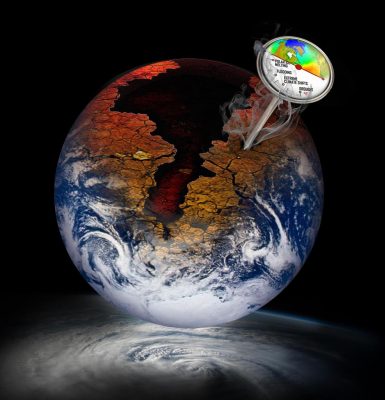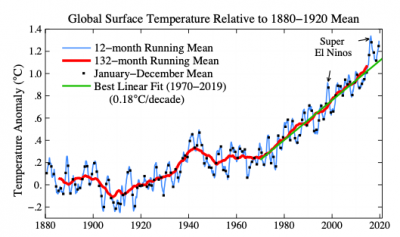Taking Our Temperature On Earth Day’s 50th Anniversary

April 22 is the 50th anniversary of Earth Day. Back in 1970 the concerns were clean air, clean water, chemical pollution, litter, and general environmental concerns. By the end of the seventies however, Dennis Hayes, the organizer, came to recognize the issue of global warming and included it. Today, climate change is appropriately the top concern for the Earth Day movement.
The dominant headline this week all over the world is the Covid-19 pandemic. It’s interesting that measuring people’s temperature is a primary diagnostic – just two degrees Fahrenheit (about one degree Celsius) can indicate the illness. It’s surprising that only a couple of degrees makes such a difference for people and for the planet. Both can tolerate extremes, but are surprisingly sensitive to long-term sustained changes of average temperature levels.
Over the last century, particularly the last fifty years, Earth’s temperature has been creeping upward. As the graph below clearly shows, the big rise in temperature coincidentally started in the seventies as well. For a century the average global temperature has been increasing, noticeably accelerating in the last few decades. Over the last century global mean (average) temperature has warmed almost two degrees Fahrenheit, one degree Celsius. The effects have now reached a point where they are obvious and irrefutable.
More ominous, on our current path, average Earth temperature this century could rise as much as seven degrees Fahrenheit, roughly four degrees Celsius, which would have catastrophic effect far beyond what we are already experiencing. That would dramatically change ecosystems, alter global weather patterns, melt the Arctic sea ice, and diminish the great ice sheets and glaciers on land. Secondary effects would include extraordinary rain, droughts, wildfires, and rising sea level.

Source: Dr. James E. Hansen, Columbia University
Given our new global crisis with this invisible and deadly pandemic, it’s a good time to reflect on the importance of health, not just for ourselves but for the planet that sustains us. It’s a good opportunity to bring up the topic with our friends, networks, and colleagues, lest they miss the connection. After years of unheeded warnings about the risk of pandemics, the current reality and public education may be just the right “environment” to help others recognize long-term risks and the need to take precautionary measures seriously.
Let this commemorative Earth Day be an opportunity to re-assess our path and priorities. Our health and survival are at stake in more ways than one.
